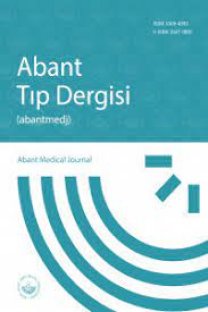Radyolojik Olarak Covid-19 Pnömonisi Düşünülen Hastalarda Antikor Düzeylerinin Değerlendirilmesi
Evaluation of Antibody Levels in Patients Radiologically Considered to Have Covid-19 Pneumonia
___
- Zhao J, Yuan Q, Wang H, Liu W, Liao X, Su Y, vd. Antibody Responses to SARS-CoV-2 in Patients With Novel Coronavirus Disease 2019. Clin Infect Dis. 19 Kasım 2020;71(16):2027-34.
- WHO Coronavirus (COVID-19) Dashboard [Internet]. [a.yer 22 Kasım 2022]. Erişim adresi: https://covid19.who.int
- El Homsi M, Chung M, Bernheim A, Jacobi A, King MJ, Lewis S, vd. Review of chest CT manifestations of COVID-19 infection. Eur J Radiol Open. 2020;7:100239.
- Zhu W, Xie K, Lu H, Xu L, Zhou S, Fang S. Initial clinical features of suspected coronavirus disease 2019 in two emergency departments outside of Hubei, China. J Med Virol. Eylül 2020;92(9):1525-32.
- Guan W jie, Ni Z yi, Hu Y, Liang W hua, Ou C quan, He J xing, vd. Clinical Characteristics of Coronavirus Disease 2019 in China. N Engl J Med. 30 Nisan 2020;382(18):1708-20.
- Helmy YA, Fawzy M, Elaswad A, Sobieh A, Kenney SP, Shehata AA. The COVID-19 Pandemic: A Comprehensive Review of Taxonomy, Genetics, Epidemiology, Diagnosis, Treatment, and Control. J Clin Med. 24 Nisan 2020;9(4):1225.
- Ai T, Yang Z, Hou H, Zhan C, Chen C, Lv W, vd. Correlation of Chest CT and RT-PCR Testing in Coronavirus Disease 2019 (COVID-19) in China: A Report of 1014 Cases. :23.
- Chung M, Bernheim A, Mei X, Zhang N, Huang M, Zeng X, vd. CT Imaging Features of 2019 Novel Coronavirus (2019-nCoV). Radiology. Nisan 2020;295(1):202-7.
- Pan Y, Guan H, Zhou S, Wang Y, Li Q, Zhu T, vd. Initial CT findings and temporal changes in patients with the novel coronavirus pneumonia (2019-nCoV): a study of 63 patients in Wuhan, China. Eur Radiol. Haziran 2020;30(6):3306-9.
- Kim H. Outbreak of novel coronavirus (COVID-19): What is the role of radiologists? Eur Radiol. Haziran 2020;30(6):3266-7.
- Munster VJ, Koopmans M, van Doremalen N, van Riel D, de Wit E. A Novel Coronavirus Emerging in China — Key Questions for Impact Assessment. N Engl J Med. 20 Şubat 2020;382(8):692-4.
- Li Z, Yi Y, Luo X, Xiong N, Liu Y, Li S, vd. Development and clinical application of a rapid IgM-IgG combined antibody test for SARS-CoV-2 infection diagnosis. J Med Virol. Eylül 2020;92(9):1518-24.
- Imai K, Tabata S, Ikeda M, Noguchi S, Kitagawa Y, Matuoka M, vd. Clinical evaluation of an immunochromatographic IgM/IgG antibody assay and chest computed tomography for the diagnosis of COVID-19. J Clin Virol. Temmuz 2020;128:104393.
- Rubin GD, Ryerson CJ, Haramati LB, Sverzellati N, Kanne JP, Raoof S, vd. The Role of Chest Imaging in Patient Management during the COVID-19 Pandemic: A Multinational Consensus Statement from the Fleischner Society. Radiology. Temmuz 2020;296(1):172-80.
- Zou L, Ruan F, Huang M, Liang L, Huang H, Hong Z, vd. SARS-CoV-2 Viral Load in Upper Respiratory Specimens of Infected Patients. N Engl J Med. 19 Mart 2020;382(12):1177-9.
- Wang M, Wu Q, Xu W, Qiao B, Wang J, Zheng H, vd. Clinical diagnosis of 8274 samples with 2019-novel coronavirus in Wuhan [Internet]. Infectious Diseases (except HIV/AIDS); 2020 Şub [a.yer 29 Kasım 2022]. Erişim adresi: http://medrxiv.org/lookup/doi/10.1101/2020.02.12.20022327
- Patel R, Babady E, Theel ES, Storch GA, Pinsky BA, St. George K, vd. Report from the American Society for Microbiology COVID-19 International Summit, 23 March 2020: Value of Diagnostic Testing for SARS–CoV-2/COVID-19. mBio. 28 Nisan 2020;11(2):e00722-20.
- Li G, Chen X, Xu A. Profile of Specific Antibodies to the SARS-Associated Coronavirus. N Engl J Med. 31 Temmuz 2003;349(5):508-9.
- Chen M, Qin R, Jiang M, Yang Z, Wen W, Li J. Clinical applications of detecting IgG, IgM or IgA antibody for the diagnosis of COVID-19: A meta-analysis and systematic review. Int J Infect Dis. Mart 2021;104:415-22.
- Zhong L, Chuan J, Gong B, Shuai P, Zhou Y, Zhang Y, vd. Detection of serum IgM and IgG for COVID-19 diagnosis. Sci China Life Sci. Mayıs 2020;63(5):777-80.
- Long QX, Liu BZ, Deng HJ, Wu GC, Deng K, Chen YK, vd. Antibody responses to SARS-CoV-2 in patients with COVID-19. Nat Med. Haziran 2020;26(6):845-8.
- Okba NMA, Müller MA, Li W, Wang C, GeurtsvanKessel CH, Corman VM, vd. Severe Acute Respiratory Syndrome Coronavirus 2−Specific Antibody Responses in Coronavirus Disease Patients. Emerg Infect Dis. Temmuz 2020;26(7):1478-88.
- Yayın Aralığı: Yılda 6 Sayı
- Başlangıç: 2012
- Yayıncı: Bolu Abant İzzet Baysal Üniversitesi Tıp Fakültesi Dekanlığı
Çocuklarda akut semptomatik nöbetin oldukça nadir bir nedeni: Kayısı çekirdeği yutulması
Sağlık Hizmetlerinin Planlanmasında Multidisipliner Yaklaşım
Blaschko Çizgilerine Yerleşen Lineer Liken Planus: Olgu Sunumu
Tuna SEZER, Feyza Nur ŞİMSEK, Eda Hilal İMAMOĞLU
Acil Servise Kafa Travmasi ile Başvuran Pediatrik Hastalarin Demografik Analizi
Hemoliz Nedeni Olarak Diyalizörler
Fotokromik Senofilcon A Kontakt Lensin Total Göz Aberasyonlarına Etkisi
Deniz KILIC, Muhammed Raşit SİREM, Yunus Naci AZİZ, Semra KOCA, İbrahim TOPRAK
Radyolojik Olarak Covid-19 Pnömonisi Düşünülen Hastalarda Antikor Düzeylerinin Değerlendirilmesi
Gözde ÖKSÜZLER KIZILBAY, Serap ARGUN BARIŞ, Emel AZAK KARALİ, Aynur KARADENİZLİ, Hüseyin UZUNER, Sevtap DOĞAN, Haşim BOYACI, İlknur BAŞYİĞİT
Geniş Bir Türk Kohortundaki Gastrik Adenokarsinomlarda Claudin 18.2 Ekspresyonu
Aynur IŞIK, Güneş GÜNER, Can ZEYNELOĞLU, Seçil DEMİRKOL CANLI, Hakki TASTAN, Aytekin AKYOL
